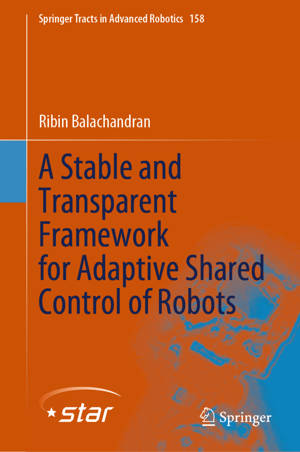
- Retrait gratuit dans votre magasin Club
- 7.000.000 titres dans notre catalogue
- Payer en toute sécurité
- Toujours un magasin près de chez vous
- Retrait gratuit dans votre magasin Club
- 7.000.0000 titres dans notre catalogue
- Payer en toute sécurité
- Toujours un magasin près de chez vous
A Stable and Transparent Framework for Adaptive Shared Control of Robots
Ribin BalachandranDescription
Robotic research and developments in computing technologies including artificial intelligence have led to significant improvements in autonomous capabilities of robots. Yet, human supervision is advisable and, in many cases, necessary when robots interact with real-world, outside-lab environments. This is due to the fact that complete autonomy in robots has not yet been achieved. When robots encounter challenges beyond their capabilities, a viable solution is to include human operators in the loop, who can support robots through teleoperation, taking complete control or shared control.
This monograph focuses on a special form of shared control, namely mixed-initiative, where the final command to the robot is a weighted sum of the commands from the operator and the autonomous controller. The weights (fixed or adaptive), called authority allocation (AA) factors, decide who has more control authority over the robot. Several research groups use different methods toadapt the AA factors online and the benefits of adaptive mixed-initiative shared control have been well established in terms of task completion success and operator usability. However, stability of the overall shared control framework, with communication time-delays between the operator and the robot, is a field that has not been examined extensively. This monograph presents methods to improve performance and stability in shared control so that the possibilities of its applications can be widened. Firstly, methods to improve the haptic feedback performance of teleoperation are developed. Secondly, methods to stabilize adaptive shared control systems, while still ensuring high teleoperation performance, are proposed. The methods are validated on multiple robotic systems and they were applied in several projects, both in space and terrestrial domains.
With the aforementioned contributions, this monograph provides an overarching framework to improve synergy between humans and robots. The flexibility of the framework allows integration of existent teleoperation and shared control approaches, which further promotes synergy within the robotics community.
Spécifications
Parties prenantes
- Auteur(s) :
- Editeur:
Contenu
- Nombre de pages :
- 181
- Langue:
- Anglais
- Collection :
- Tome:
- n° 158
Caractéristiques
- EAN:
- 9783031479335
- Date de parution :
- 03-01-24
- Format:
- Livre relié
- Format numérique:
- Genaaid
- Dimensions :
- 158 mm x 236 mm
- Poids :
- 521 g

Les avis
Nous publions uniquement les avis qui respectent les conditions requises. Consultez nos conditions pour les avis.






